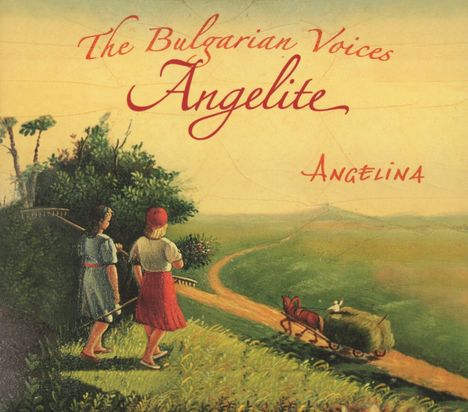The Bulgarian Voices Angelite: Angelina auf CD
Angelina
Herkömmliche CD, die mit allen CD-Playern und Computerlaufwerken, aber auch mit den meisten SACD- oder Multiplayern abspielbar ist.
(soweit verfügbar beim Lieferanten)
- Label:
- JARO
- Aufnahmejahr ca.:
- 2013
- Artikelnummer:
- 2920772
- UPC/EAN:
- 4006180431029
- Erscheinungstermin:
- 15.2.2013
Es sind faszinierende, glockenhelle Stimmen. Der hypnotische Gesang vezaubert, denn es ist eine ganz ursprüngliche Art zu singen. Wer einmal ein Konzert des einzigartigen Chores live erlebt hat, also einmal seine Seele von diesem Gesang berühren lies, kann dem Zauber und der Faszination von The Bulgarian Voices - Angelite nicht mehr vergessen. Als die Welt erstmals diese besondere Art zu singen zur Kenntnis nahm, zur Zeit des Eisernen Vorhangs, staunte sie über die bulgarischen Stimmen und war begeistert.
Seit 1987 unternehmen sie Konzertreisen durch die ganze Welt und erhielten 1993 zwei Grammy-Nominierungen, sie spielten u. a. bei der Verleihung des Friedensnobelpreises in Oslo und zur 850 Jahrfeier von Moskau auf dem Roten Platz. Die Trennung zwischen Ost und West, Jung und Alt, Pop und Klassik wird aufgehoben. Äußerlich wirkt der A-cappella-Chor wie eine grellbunte Volkstanztruppe, doch die Mischung aus aberwitzigen Rhythmen und verwegenen Akkorden, der schlicht unverblümt direkte Klang fegen jeden Verdacht des Folklore-Kitschs umgehend aus den Gehörgängen der Zuhörerinnen. lhre Musik wurde in Hollywood-Filmen verwertet, in internationalen Werbespots benutzt, von Dj's aus aller Welt gesampelt.
Product Information
The album presents an opportunity for professional ethno-music speculations and analysis but the main idea is to share with the listeners the pleasure of the music. Each song brings its own touch or colour to the kaleidoscopic picture, which reveals the musical atmosphere and temperament of the Bulgarian folklore. The variety of performances highlights the remarkable singing qualities of the 20 singers – a polyphonic instrument in the hands of their conductor and soloists – successors of ancient art of singing. One of the unifying musical elements in this project is the rhythm. The Bulgarian folkmusic is famous for the abundance of irregular, asymmetric measures – dubbed by Bela Bartok the “Bulgarian rhythm”. Many of the songs on the album are built on such a meter and rhythm base. The sound of the drum in Bulgaria is a symbol of the feast and of dancing horo (round chain dance). We can hear it in some of the authors’ arrangements, performed by one of the best Bulgarian percussionists – Stoyan Yankulov.
In the mosaic structure of the program cohabit contrasting in their characteristics – solo, choral and in some of them instrumental accompaniment. The folklore, ancient and modern, is present with elegant balance between tradition and modern approach. Choir and soloists pursue strictly the respective region, local style and musical dialects. They recreate the patterns of the old musical folklore in a mode close to the old traditions from the different regions.
A musical surprise in this album is a song taken from the folklore of an ethnic group Karakachani (nomad mountain shepherds) who live for ages in Bulgaria. The singer, performing the song is one of them by birth. The traditional melody is harmonized by instrumental accompaniment. The compositions of Zdravko Manolov “Tapan bie” and Georgi Petkov “Ochi, ochi”, “Gaidine sviriat”, show the individual approach of the authors of closeness or remoteness to the original traditional song. ”Erke, mori, Erke” - a traditional song from the Shope region is arranged by Georgy Petkov into multi-voice choral version with perceptible Shope discordance. The drums emphasize complex rhythmic formulas and fragmentation into irregular measure of 12 / 16.
Within the wealth of colors in the program, two songs stand out for their styles – they are the works of Theodosii Spassov, recognized as the best kaval player in the world. His two songs in the program, written specially for this project, reflect his view of the world – concentrated, playful, noble, heart-felt and natural.
The remarkable Bulgarian composer Ivan Spassov uses in his compositions aleatory technique with overlapped polyphonic patterns. Creatively developed, from the roots of the traditional song “Leilinko, kuzum pilianze” springs a creatively developed musical work with free, irregular harmony and soft sonority. This is one of the last songs of Ivan Spassov, written at the end of his path of life, specifically for The Bulgarian Voices - Angelite. The music reveals the philosophy of the author relating to the universe and eternity.
The last song of the album is the end of a journey, which starts in the distant past and ends in our days. A journey in which one can experience the power of the folk art, feel the bond between generations and learn about the millenary Bulgarian music history.
Disk 1 von 1 (CD)
-
1 Postoi, milo, yasno slanze (Please wait, bright sun)
-
2 Erke, mori, Erke (Erke, dear, Erke)
-
3 Imala baba (Once upon a time)
-
4 Vrabche (Sparrow)
-
5 Angelina
-
6 Zhani, navaliai, nevesto (At harvest-time)
-
7 Tapan bie (Beating the drum)
-
8 Ochi, ochi (Eyes, Eyes)
-
9 Dva tapana biyat (Two drums are beating)
-
10 Gaidine sviriat (Bagpipes playing)
-
11 More da sum sonze (If I were the sun)
-
12 Ta nyata (Youth)
-
13 Leilinko, kuzum pilyanze (Leilinko, my darling)
Mehr von The Bulgarian V...
-
The Bulgarian Voices AngelitePassion, Mysteries & Delight (Limitierte Sonderausgabe zum 30-jährigen Jubiläum)2 CDsAktueller Preis: EUR 31,99
-
The Bulgarian Voices AngeliteMountain TaleCDAktueller Preis: EUR 17,99
-
The Bulgarian Voices AngeliteHeritageCDAktueller Preis: EUR 17,99
-
The Bulgarian Voices AngeliteMercy For The LivingCDVorheriger Preis EUR 19,99, reduziert um 0%Aktueller Preis: EUR 17,99







